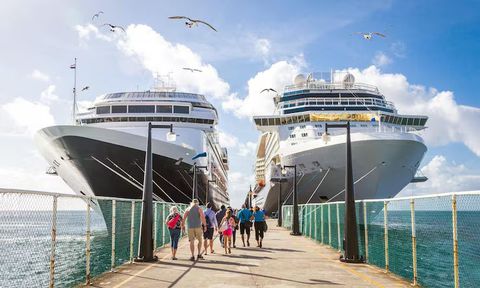A travel company acts as the bridge between your plans and reality. It manages accommodations, transportation, tours, and safety key components of a smooth trip. With thousands of options available globally, travelers today face information overload.
Digitalization has transformed travel planning. Online platforms now allow users to compare packages, read verified reviews, and track real-time updates. The industry is more transparent than ever, but also more competitive. Choosing wisely ensures reliability, fair policies, and quality travel experiences.
Why This Topic Is Important Today
Modern travelers are looking for convenience, flexibility, and security. The global tourism recovery after 2020 highlighted how essential well-structured travel companies are for risk management and quick responses to disruptions.
Key factors influencing travelers’ decisions today include:
-
Transparency: Clear pricing, refund rules, and travel insurance options.
-
Sustainability: Eco-friendly travel practices and responsible tourism.
-
Customization: Tailor-made itineraries and flexible booking systems.
-
Digital Support: Apps, virtual tours, and 24/7 customer assistance.
Reliable travel companies not only plan your trip but also support you if unexpected issues arise—such as delays, cancellations, or health-related emergencies.
Recent Trends and Updates in the Travel Industry
The travel industry has changed significantly between 2024 and 2025, shaped by technology and shifting traveler preferences. Some key developments include:
| Trend | Description | Example or Impact |
|---|---|---|
| AI-Powered Travel Planning | Companies use artificial intelligence to create personalized itineraries. | Expedia and Booking.com introduced AI trip assistants in 2024. |
| Sustainable Tourism Growth | Travelers prefer eco-conscious operators and destinations. | 2025 saw a 35% rise in “green” tour bookings globally. |
| Digital Nomad Support | Agencies now cater to long-term remote workers. | Countries like Portugal and Thailand expanded digital nomad visas. |
| Increased Safety Measures | Health certifications and secure data systems became mandatory. | Many tour operators adopted verified travel safety badges. |
| Flexible Booking Policies | Free date changes or open-dated vouchers are now common. | Implemented widely after the pandemic disruptions. |
These changes emphasize how technology and transparency are redefining how travelers select and trust travel companies.
Laws, Regulations, and Government Policies Affecting Travel Companies
Travel companies operate under strict national and international regulations to ensure consumer protection and ethical business conduct. Understanding these helps travelers choose compliant and credible operators.
Common Regulatory Areas:
-
Licensing and Accreditation: Many countries require travel agencies to be registered with official tourism boards.
-
Consumer Protection Acts: Safeguard travelers from fraud or misleading claims.
-
Refund and Cancellation Policies: Standardized to ensure fair compensation.
-
Data Privacy Laws: Companies must comply with global privacy rules like GDPR for handling personal information.
-
Sustainable Tourism Policies: Governments encourage eco-friendly travel planning and local community support.
For instance, in India, travel operators are encouraged to register under the Incredible India Tourism Facilitator Program, ensuring professionalism and quality. In Europe, agencies often comply with the Package Travel Directive (EU Directive 2015/2302) for traveler rights and protection.
Checking whether a company follows such regulations is a practical first step in evaluating reliability.
Useful Tools and Resources for Choosing a Travel Company
Today, travelers can rely on several digital resources to evaluate and compare travel companies effectively:
1. Review and Comparison Platforms
-
TripAdvisor: Provides traveler reviews and ratings for agencies and tours.
-
Trustpilot: Independent consumer reviews that help assess reputation.
-
Google Travel: Displays real-time user feedback and booking insights.
2. Government and Accreditation Resources
-
IATA (International Air Transport Association): Lists certified travel agents.
-
WTTC (World Travel & Tourism Council): Tracks sustainability and safety benchmarks.
-
Local Tourism Boards: Provide lists of licensed operators in your country or destination.
3. Travel Planning Tools
-
Skyscanner, Kayak, and Rome2Rio: Compare transportation and route options.
-
TripIt or Wanderlog: Help organize itineraries efficiently.
-
Google Maps and Street View: Useful for checking destinations, hotels, and routes in advance.
4. Sustainability and Safety Tools
-
Green Globe and EarthCheck: Rate companies on eco-friendly operations.
-
Safe Travels Stamp (WTTC): Identifies businesses meeting global health safety standards.
Using these resources ensures you make informed decisions and avoid unreliable providers.
Key Factors to Evaluate When Selecting a Travel Company
Choosing the right company involves more than just comparing prices. Consider these informational checkpoints:
Reputation and Reviews
Look for consistent positive feedback, industry awards, and transparent complaint handling.
Experience and Expertise
Long-standing companies with proven records often provide better crisis management and destination knowledge.
Transparency in Communication
Companies should clearly explain booking conditions, inclusions, and policies.
Customer Support and Responsiveness
Reliable 24/7 assistance can make a major difference during emergencies.
Certifications and Affiliations
Accreditations from IATA, TAAI, or national tourism boards add authenticity.
Digital Accessibility
An informative website, secure payment gateway, and real-time itinerary tracking tools are signs of professionalism.
Tips and Insights for Smarter Travel Decisions
-
Read Beyond Star Ratings: Focus on detailed reviews and how issues were resolved.
-
Verify Credentials: Check registration numbers or certificates before booking.
-
Ask About Contingency Plans: Ensure the company can handle delays, medical needs, or sudden cancellations.
-
Compare Packages Carefully: Look at inclusions and terms, not just destinations or price tags.
-
Use Official Channels: Always confirm bookings through official websites or verified partners.
-
Prioritize Transparency: Avoid vague policies or hidden fees—clarity builds trust.
Frequently Asked Questions (FAQs)
1. How can I verify if a travel company is legitimate?
Check government tourism board listings, read independent reviews, and look for certifications like IATA or WTTC.
2. What should I look for in travel company reviews?
Focus on consistency in service quality, problem resolution, and transparency rather than only ratings.
3. Are online travel companies safe to use?
Yes, as long as they use secure payment systems (HTTPS), verified contact details, and transparent policies.
4. What’s the difference between a tour operator and a travel agency?
Tour operators design and conduct trips directly, while agencies act as intermediaries selling packages or services.
5. How can I identify sustainable travel companies?
Look for eco-certifications like Green Globe or EarthCheck, and companies that promote local culture and conservation.
Conclusion
Choosing the right travel company is an essential step toward a safe and rewarding journey. A reliable company ensures convenience, transparency, and peace of mind from booking to return. In today’s evolving travel landscape, technology, sustainability, and trust define excellence.
By using verified tools, checking accreditations, and comparing experiences thoughtfully, travelers can make well-informed choices that enhance both personal satisfaction and responsible tourism. A good travel company isn’t just about destinations it’s about delivering authentic, stress-free, and enriching global experiences.






